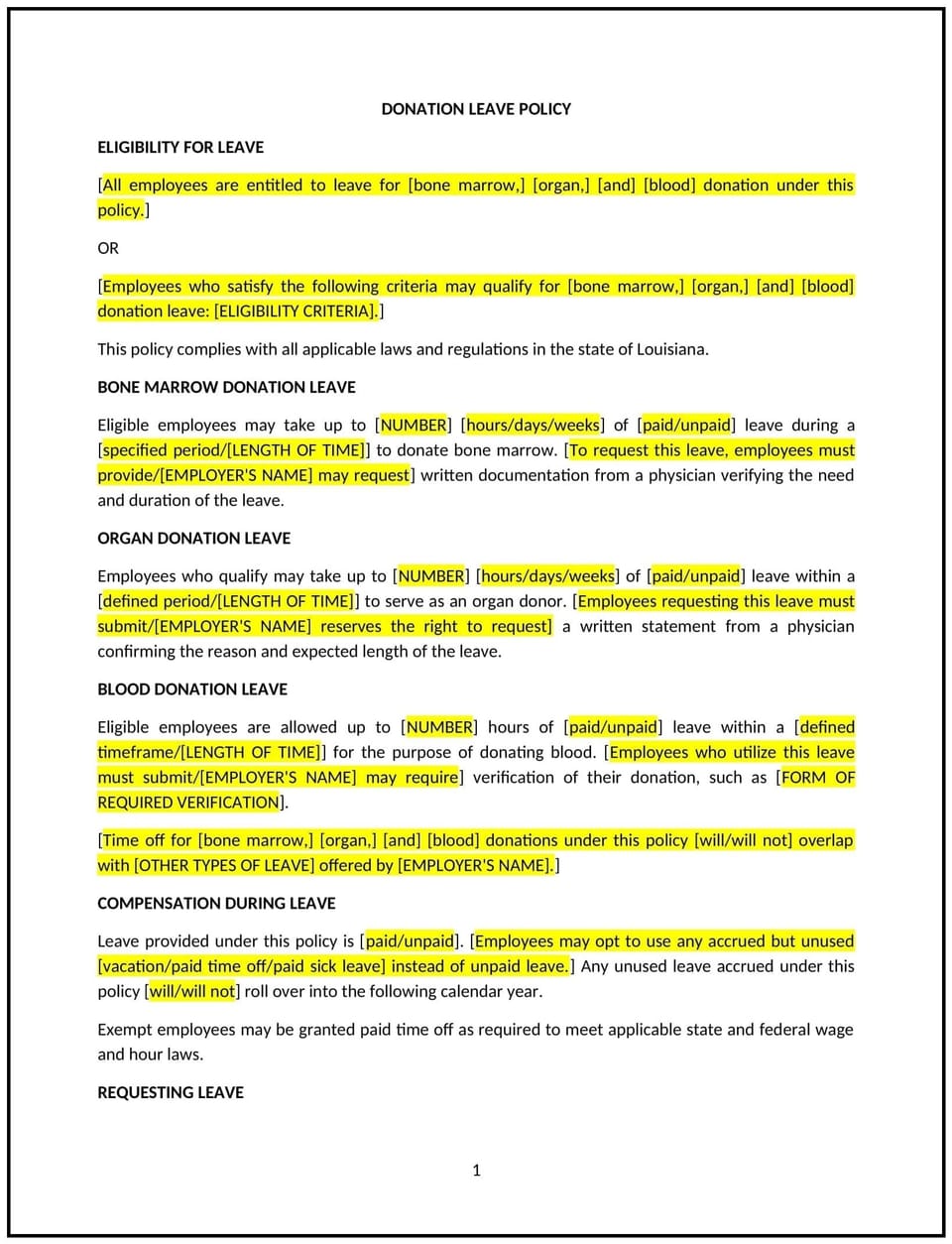Donation leave policy (Louisiana): Free template

Donation leave policy (Louisiana)
This donation leave policy is designed to help Louisiana businesses support employees who wish to donate blood, organs, or other life-saving contributions. It outlines the process for requesting leave, eligibility criteria, and guidelines for managing time off while balancing employee needs and operational requirements.
By implementing this policy, businesses can promote employee well-being, encourage altruism, and create a supportive workplace culture.
How to use this donation leave policy (Louisiana)
- Define eligible donations: Specify the types of donations covered, such as blood, plasma, bone marrow, or organ donation.
- Establish eligibility criteria: Clarify which employees qualify for donation leave, such as full-time or part-time workers.
- Outline leave duration: Provide guidelines for the amount of time off employees may take for different types of donations.
- Detail request procedures: Explain how employees can request leave, including required notice and documentation.
- Address pay status: Specify whether donation leave is paid or unpaid and whether employees may use other accrued leave balances.
- Include return-to-work expectations: Clarify any steps employees need to take before returning to work after donation leave.
Benefits of using a donation leave policy (Louisiana)
Implementing this policy provides several advantages for Louisiana businesses:
- Supports employee health: Allows employees time to recover after making life-saving donations.
- Encourages community involvement: Promotes charitable actions and employee engagement.
- Enhances workplace morale: Fosters a culture of compassion and mutual support.
- Provides clear guidelines: Reduces misunderstandings about leave requests and usage.
- Reflects Louisiana-specific considerations: Aligns with local practices and workplace dynamics.
Tips for using this donation leave policy (Louisiana)
- Communicate the policy clearly: Ensure employees understand their rights and responsibilities regarding donation leave.
- Train managers: Equip supervisors to handle leave requests sensitively and efficiently.
- Monitor leave usage: Track donation leave to ensure consistency and prevent misuse.
- Provide recovery resources: Offer guidance on available support, such as health services or counseling, after donations.
- Update regularly: Revise the policy to reflect changes in workplace practices or Louisiana-specific guidelines.
Q: What types of donations are eligible under this policy?
A: Eligible donations may include blood, plasma, bone marrow, or organ donations, as specified by the business.
Q: How much leave can employees take for donations?
A: The amount of leave depends on the type of donation. For example, blood donation may require a few hours, while organ donation could involve multiple days.
Q: Is donation leave paid or unpaid?
A: The pay status of donation leave is determined by the business policy, which may allow paid leave for certain donations or the use of accrued leave balances.
Q: What documentation is required for donation leave?
A: Employees may need to provide proof of donation, such as a note from a medical provider or donation center.
Q: Can employees combine donation leave with other types of leave?
A: Employees may be allowed to use other accrued leave, such as sick or vacation days, to supplement donation leave if necessary.
Q: How often should this policy be reviewed?
A: The policy should be reviewed annually or when changes in Louisiana laws or workplace practices impact donation leave.
Q: What support can businesses offer employees after donations?
A: Businesses can provide recovery time, health services, or referrals to counseling or support groups if needed.
This article contains general legal information and does not contain legal advice. Cobrief is not a law firm or a substitute for an attorney or law firm. The law is complex and changes often. For legal advice, please ask a lawyer.


